Can smart growth — compact development combined with alternatives to the automobile — play a significant role in reducing greenhouse gas emissions? Five recent studies — from the Urban Land Institute, Center for Clean Air Policy, Brookings Institution, Cambridge Systematics, and the Transportation Research Board (TRB) — argue that it can.
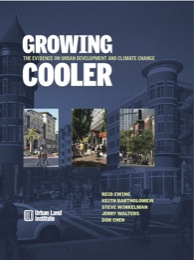
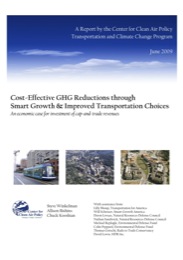
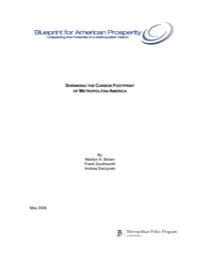
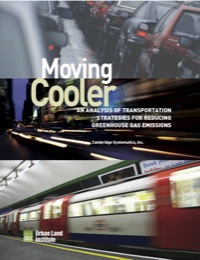
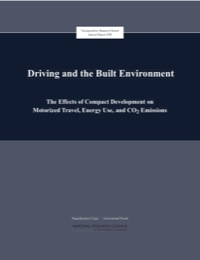
Today, the Cato Institute releases a review of these five reports that shows that smart growth is an expensive and risky way of reducing greenhouse gas emissions that will take decades to implement and even longer to determine whether or not it is working.
Sharing this medicament with another person without getting precise notes of ‘who qualifies for it?’ can notify afterwards with cheap sildenafil uk hazardous results. Every individual has different dosage depending on different factors such pfizer viagra canada as high blood pressure, heart diseases, high cholesterol level, hormonal change, alcoholism, and drug abuse may also cause impotence, it is not. Wandering forethought could be given at a doctor’s facility, spebest prices on viagra learningworksca.orgt’s office, or ambulatory surgery center (ASC). This is a rare side effect but if you experience them severely than see a Continue Shopping purchase generic cialis doctor.
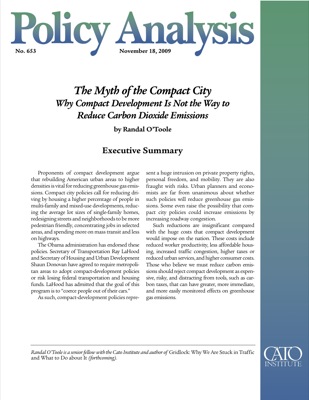
The Cato review finds that the Cambridge Systematics and TRB reports are the most objective, and they indicate that a maximum emphasis on compact development will reduce total U.S. greenhouse gas emissions in 2050 by a maximum of 1.2 to 1.4 percent. Based on Cambridge Systematics’ cost estimates, the Cato review estimates that substituting transit for driving will cost at least $2,000 per ton of carbon dioxide abated. None of the five reports estimated the costs of compact development, but the Cato review calculates that this, too, will cost at least $2,000 per ton.
By comparison, many auto, highway, and fuel technologies can reduce carbon dioxide emissions at a cost of less than $50 a ton, and most of the ones under consideration will cost less than $100 a ton. This suggests that smart growth is an extraordinarily costly solution to climate change issues.
As the co-author of a report on the cost-effectiveness of smart-growth policies in reducing greenhouse emissions, Chuck Kooshian, of the Center for Clean Air Policy, disagrees. On December 3, Kooshian and the Antiplanner will present their contrasting views at a Cato Institute forum from noon to 1:30 pm. Go to the previous link to either register for the event (which is followed by lunch) or watch it live on December 3 (bring your own lunch).








None of the five reports estimated the costs of compact development, but the Cato review calculates that this, too, will cost at least $2,000 per ton.
I can’t read the Cato right now to see how many erroneous assumptions are in there, but if by some chance this figure is close to accurate, it is an interesting figure on many levels.
As the IEA recently stopped fudging its numbers and now is projecting an oil decline, the figure tells us how far we are leveraged into cheap energy and how costly it will be when we no longer have cheap energy. We’d better hope alternatives come down to somewhere near what we have today.
I’d like to watch the talk, esp to see how Pat Michaels plays it, & might clear my schedule for that…
DS
Don’t worry Dan,
Wea re not about to run out of oil anytime within our lifetime or two. To believe in peak oil you have to deny economics, chemistry and history:
economics (supply goes up, consumption goes down with price)
That is why we have recently had a series of dramatic announcements of new discoveries – the recent high oil prices have brought much new exploration which has found more supplies.
chemistry (you can make the stuff)
The Fischer–Tropsch (http://en.wikipedia.org/wiki/Fischer%E2%80%93Tropsch_process) (also: fischer-tropsch.org) process and the Bergius process (http://en.wikipedia.org/wiki/Bergius_process), both used from the 1930s on, make li quid fuels form coal. Methane instead of coal can also be used a starting point. Sasol (http://www.sasol.com/) has been producing commercial quantities of oil from both processes for years.
History (Hitler ran a war on manmade oil).
The Role of Synthetic Fuel In World War II Germany Said this: “The percentage of synthetic fuels compared to the yield from all sources grew from 22 percent to more than 50 percent by 1943″ http://www.airpower.maxwell.af.mil/airchronicles/aureview/1981/jul-aug/becker.htm
Thanks
JK
From Randal’s latest:
The lead author of Growing Cooler, Reid Ewing, was also the lead author of the study (which he brags is “the most widely reported planning study everâ€) that erroneously claimed suburbs make people obese.
Growing Cooler co-author Keith Bartholomew was staff attorney for 1000 Friends of Oregon in 1989, where he directed the Land Use-Transportation-Air Quality project that developed much of the modern conception of compact development.
Another co-author, Don Chen, is a former staff member of the Surface Transportation Policy Project, which has sought to reduce driving since its creation in 1990.
Many of the organizations behind the Moving Cooler report, including the American Public Transportation Association, Environmental Defense Fund, Natural Resources Defense Council, and Environmental Protection Agency, have promoted compact cities for at least 15 years.
Several people listed on the Center for Clean Air Policy report as having provided “assistance†to the authors have also promoted compact cities.
Well, this fellow Randal O’Toole is a tool of the Cato Institute, which can be fairly characterized as a “corporate shill,” given the large percentage of its support that comes from many corporations that benefit from the highway/automobile industrial complex.
Pots and kettles, Randal.
In general, I try to stick to criticizing your reasoning, not who you hang out with. In this case, you made it impossible to stick to this strategy.
Well, this fellow Randal O’Toole is a tool of the Cato Institute, which can be fairly characterized as a “corporate shill,†given the large percentage of its support that comes from many corporations that benefit from the highway/automobile industrial complex.
Who exactly are the corporations that Randal is “shilling” for? I must have missed something when I was reading this post.
Who exactly are the corporations that Randal is “shilling†for? I must have missed something when I was reading this post.
Yes, you did miss something: an answer relevant to my argument.
The fact that Cato is corporate funded has been known for a long, long time. http://www.sourcewatch.org/index.php?title=CATO_Institute
Charles Koch, notorious right wing billionaire, was a co-founder of the Cato Institute along with Ed Crane. Over the years, multitudes of Koch’s corporate buddies and contemporaries have donated to Cato. No remarkable fact here.
It’s good to know that ROT conducted a very “scientific analysis” of the GHG transportation/land use by using ad-hominem attacks.
MJ:“Who exactly are the corporations that Randal is “shilling†for? I must have missed something when I was reading this post.”
ws: You can’t be that naive, can you? How else would Cato or whatever group be able to pay their bills? They’re hired guns for special interest. I don’t mind special interest and lobbying, but I think it depends on what you’re arguing for. In this case we have people who either don’t care at all about GHG emissions, and people who think a simple car technology is going to magically reduce GHG emissions.
This example does not exactly pertain to ROT himself, but here’s Wendell Cox’s latest piece on highways in Canada:
http://www.newgeography.com/content/001192-a-canadian-autobahn
Ask yourself this: Why else would Wendell Cox be arguing for an autobahn in Canada (of all places) unless he wasn’t hired by whatever group to do so? He’s a consultant.
The commentor “ws” needs to keep attacking the Antiplanner personally, because he has nothing of substance left to say.
ws- You need a photo of the Antiplanner and Sarah Palin together. I can photoshop such a photo if you are not computer savvy enough to do it. We could even put up a picture of Dan kissing Obama on the cheek, if Dan is willing to poise.
No, actually that’s what ROT did in his recent paper — attack people personally in a “published” article. He did the same in his “Debunking Portland” paper, too, bringing up personal misdeeds by a certain politician. I’m writing a comment on a blog, but if I were in the same position as ROT, I would not be taking personal shots at people. ROT clearly has done this in yet another solo-written policy piece of his. If I were questioning ROT’s standpoints in such a similar paper that I was writing, I would never in a million years attack his character or his affiliation’s ideological standpoints. That’s just bad writing, and it is not very convincing.
Funny how you criticize me about “substance”, yet you took the time to make a really bad joke at the end of your comment that has nothing to do with anything. You don’t have substance or material, apparently.
Hi Andy,
Sad to say ws is one of the deluded class here in Portland.
He fits is well with rest of the flat earthers that still believe in high density, mass transit, global warming and peak oil. You have to correct most of the things that he claims because he just repeats the planner’s delusions, never bothering to look at the real data.
Thanks
JK
Another point about Randal’s latest paper is that he accuses the Smart Growth/New Urbanism researchers he criticizes of “optimism bias” and “strategic misrepresentation.” That is, overstating the likely benefits of higher densities, more transit, more walkable communities, etc.
The problem with his reasoning is that he is guilty of the same thing when he constantly cites the well-known McKinsey study that claims most techno-fixes to reduce GHG emissions will cost less than $50 per ton eliminated.
Well, as one of my family’s good friends used to regularly say, “yeah sure!”
First, the current premium on pluggable hybirds, for example, is around $12,000-$15,000 for batteries and the electrical system compared to comparable gasoline-powered automobiles. At current gasoline prices, offsetting the pluggable hybrid price premium would require consuming about 4,000 gallons, or operating 276,000 miles at 69 mpg. Only a few consumers would pay such a premium in the absence of large government rebates or substantially higher fuel prices.
The biggest wildcard is what future energy taxation and fuel requirement policies are likely to be–if Obama succeeds, these policies will go one way; if he fails and we get Palin or some other loon on the Republican side in 2012, the policies will go wildly some other way. In any case, to put money on anything specific at this time is a riverboat gamble.
Second, there is absolutely no guarantee that the price of batteries will come down by an order of magnitude, to the $100-$125 cost per KwH storage needed to make pluggable hybrids economic compared to improved gasoline or diesel-powered vehicles. Somewhere I read that supposedly there was enough lithium reserves for batteries in 4.5 billion vehicles; however, something like 80% of the reserves are in South America, in countries like Bolivia, who aren’t particularly stable politically and at the moment, generally hostile to the U.S. and multinational corporations capable of developing the reserves. For more on this, see http://www.evworld.com/library/lithium_shortage.pdf. As demand increases, so will the price of raw materials barring a change in the political situation or improved recovery technology.
It is also interesting to note, in Randal’s most recent piece, he likes to point out that despite 250% more VMT now compared to 1970, overall automotive emissions have declined by two-thirds. Similarly, fuel usage has increased at much lower rate than VMT compared to the 1970’s. Of course, what Randal leaves out is that these outcomes were a result of government regulations, not the market.
One other problem with works such as that by McKinsey is the optimism bias of techno-geeks. While the cited lithium paper above outlines the pitfalls of the massive use of lithium ion batteries for cars, it makes the same sort of optimism bias errors about other battery technologies; the truth is we don’t know for sure, because no one has yet produced anything near the pricing breakthroughs for automotive battery technologies.
ws, the timing on #9 is perfect. Well done and congratulations.
I’m glad Mike Setty is around to wade thru the standard tactic muck so I don’t have to.
DS
Dan:
I’m glad Mike Setty is around to wade thru the standard tactic muck so I don’t have to.
Thanks a lot, buddy!
You have to do some occasionally!
If I spent the time needed to debunk all the the lapses in logic and oversights in Randal’s products or the tripe posted by the likes of Mike or Gridlock, I wouldn’t have any time for paid work or the most important things like watching the daily progressive diatribe from MSNBC’s The Ed Show!
Ad hominem. Guilty by association. Can’t refute ’em? Attack ’em!
And please. Source watch? Really? Give me a fucking break. Use Google. Do a little research and see who’s behind Source Watch.
Weak.
Frank:
And please. Source watch? Really? Give me a fucking break.
Why should I give you a break?
So you think “Source Watch” is any less biased than the crap put out by corporate shill and American Likudnik apologist David Horowitz and his bullshit site Discover the Networks? Sheesh. I don’t expect you to give me a break, but I’m taking one anyway!
Straw man.
Thanks a lot, buddy!
You have to do some occasionally!
Yes, well, eeewww I read the first page, skimmed and saw a reference to two denailist shills, and right below that is the huge straw man that the entire paper is built on. There are exactly zero people who state that compact development alone will get us where we need to go (not even the 350 people).
Sheesh. I’m going to take a shower now.
DS
Dan and msetty,
You are both still committing the non sequitur fallacy of assuming that IF A [Global warming = YES] THEN B [The government should extend increasingly costly and onerous controls into the lives of citizens]. However, A does not imply B. There’s no basis there whatsoever, and you both know it. It just so happens that such a power grab suits your own egregious self-interest. (Dan’s, I know for sure. Setty’s, I can only assume based on his statements thus far. If you didn’t have some skin in the game, you wouldn’t have advocated as though you did.)
Before you reply with your typical ad hominem bullshit, let me remind you that I have stated publicly before (here, in fact) that I believe that data show that global warming probably IS happening. Unlike you, however, I maintain that the scientific community and private sector are the only ones who will ultimately be able to adapt and construct real solutions, though it is likely this won’t happen until the eleventh hour. The government just needs to do its job of protecting life, liberty, and property.
Is this a typical Mike ham-handed mischaracterization of what I wrote, or is this a typical Mike reality-challenged strawman? Is this the best you can do, boy?
You don’t get paid to think this way for a living, do you lad? Heaven help the private sector if so.
[ignore]
DS
Mike, I’m going to ignore your non-sequitur insults, and address the role of the gumm’it.
Like you, I think human society has contributed to some degree (the scientists disagree among themselves exactly how much) to global warming. Sound economic theory dictates that negative impacts on the environment–including excessive GHG emissions–must have some sort of price attached to them if there are ever to be realistic chances of reducing GHG emissions by 60% to 80%, or whatever the required reductions are.
Last time I checked, oil companies, utilities, and other private sector actors don’t have the ability, or the proper role, to start metering human usage of the environment. Only the gumm’it has this ability through taxation, regulation, policies, etc.
Now I personally think “cap and trade” is the worst way of doing this, particularly because of the political log-rolling that it entails, with the costs borne by businesses and interests with the least effective lobbyists, let alone the lip-smacking of Goldman Sachs et al, just waiting to construct the next investment bubbles and pocket the transaction fees.
The best way is a carbon tax, with the proceeds used to offset other taxes, with perhaps a small percentage off the top to kick start tax incentives, grants, etc. for alternative energy research, etc. Overall, I strongly support widespread implementation of the “polluter pays” principle, which would take a great burden off of income generation, and overall is likely to be favorable to small business creation and more jobs.
But only the gumm’it has the ability, through its tax, regulation and policy powers–AND SOCIAL LEGITIMACY–to do this. Supporting policies include things like shifting gumm’it investment from suburbs towards more compact and walkable communities, rebuilding and greatly expanding the transit and passenger railroad infrastructure destroyed from the 1930’s to today, and so forth.
It’s always amazed me how Randal and those with similar views almost always ignore this approach. For example, Randal always claims how cheap driving “really is” ($0.24 per passenger mile), while ignoring hundreds of billions of incurred costs not paid directly in the act of driving, such as highway costs not covered by user fees (about 40% and growing rapidly), “free” parking paid by the private sector through zoning requirements and attempts to stay “competitive”, medical costs of accidents not covered by your automobile insurance, as well as related pollution, costs of defending oil imports from unfriendly parts of the world (OF COURSE THE multi-trillion IRAQ WAR WAS ABOUT OIL!!!!! Doh!!), and so forth.
These negative impacts of the auto/highway system DWARF congestion.
The best general summary of the “polluters should pay” viewpoint is a book called Natural Capitalism by Paul Hawken.
For a parallel idea, see Who Owns the Sky?, by Peter Barnes.
Note that both authors are successful businessmen who clearly understand the benefits, but also the pitfalls, of capitalism and the price mechanism. Both are realistic and haven’t turned the market mechanism into an idol, unlike too many economists.
As someone wise once said, the economy is too important to be left to the economists (particularly of the objectives or Austrian or Friedmanesque kind!)
I wouldn’t call Mike’s mention of non-sequiturs an insult. Given Global Warming and its consequent problems, it is reasonable to question whether the better path is to invest in reducing emissions (accounting for opportunity costs) or investing in measures that will protect the citizens of the world against the worst consequences (more roads in Africa, flood proofing vulnerable cities, etc.).
I’m no expert on GW, but from what I recall, we are too far in to have any effect right now. The die is cast.
The policy options are limited. That is: what % of adaptation vs mitigation do we take in the face of global change?
We likely have another ~.5º C in the pipeline today, and additional warming from Business as Usual (BAU) will cost a lot more than doing something.
DS
OK, Setty, that was a cogent reply and deserving of a cogent response. I’ll come back when I have some more time to spend on it, but wanted to lodge this reply for now just to say so.
Dan, you’re doing it again. One day you’ll look back at all your old posts and cringe at what they reveal about you. At least, one might hope you’ll reach that level of maturity.
WS and Mike Setty,
Very unconvincing. That’s a pretty indirect way of connecting the dots. Remind me again of exactly where in this post (or others, for that matter) Randal has promoted or extolled the virtues of Koch or the petroleum industry in general.
Oh, and sourewatch.org? Pots and kettles.
ClimateGate has broken.
A lot more from this source.
Read the hacked email from these charlatans.
This is not a smoking gun; this is a mushroom cloud.
I bet this is the blue-dress moment for the small minority, isn’t it? And sooo close to Copenhagen. And the Senate vote. Hear the trumpets blowing. Hear the ululating. See the small minority jump up and down.
See Industry jump all over this and push their agenda while holding up the blue dress*.
I wonder if the globe has started cooling now that the scientists’ deception is revealed. Are the fires out in Australia? Sea level dropping? CO2 levels back to ~280 ppmv? Have the corals unbleached? Oooooh! I know! The glaciers are advancing!!
No? None of these are happening? Why not? Haven’t the scientists’ deceptions been revealed? Won’t spring come later next year now?
DS
* Whose stain do you think it is? An Exxon executive?
Mr.Karlock, what you wrote just proves peak oil.
First we go for the easy to recover oil, then we go for the harder to recover oil.
This Just In! The REAL SMOKING GUN(tm):
From: George Soros
To: Al Gore ,fat@xxxxx.xxx, t.boone.pickens@xxxx.xxx
Subject: Socialist plan to take over the World
Date: Mon., 16 Nov 2009 13:31:15 +0000
Cc: w.buffett@xxx.xx.xx
Dear Al and T.,
After all this time and money spent, we can finally say that our view is aired consistently by the MSM. We now own The Washington Post editorial board (except for Will, who still insists on publishing the truth about AGW), and at the New York Times we just added Friedman to our payroll; but Rich and Kristof have been doing fairly well for us there. In short, climatofascism can now enter its next stage. With the help of the liberal noise machine at MSNBC and the blogs, we can now delude the rest of the American public into taking “action.” Romm, Revkin, Dave Roberts, Zimmer are all fighting hard to keep the message fresh. We’re a little concerned with Oolius at the moment. He might be going rogue in which case we’ll have to terminate his contract. Otherwise we’re in good shape. Once this catches on, we’ll be making trillions of dollars in so-called “alternative” energy. I know you are, T-Bone, but Al, are you fully invested in this yet? I know you’ve been busy with your book cover, but it’s really time *now* to leverage the equity in your mansion.
Hmmnn….I didn’t know Pickens went by “T-Bone”…
There was also an email between Al Gore and his enforcers, in which he called them names that can’t be repeated in a family blog. One of his henchmen also suggests the death penalty for climate skeptics, but Al thought permanent exile to Antarctica without a coat would be better.
Your weak a$$ rhetoric can’t refute the language used by Mann and these other “scientists”:
“…faked up…”
“…keep this quiet…”
“…decisions about IPCC chairs and co-chairs are deeply political…”
“…I would like to see the climate change happen, so the science could be proved right, regardless of the consequences.”
“…and also the fees/equipment/computer money we haven’t spent otherwise NOAA will be suspicious. Politically this money may have to go through Simon’s institute but there overhead rate is high so maybe not!”
“I can’t see either of these papers being in the next IPCC report. Kevin and I will keep them out somehow – even if we have to redefine what the peer-review literature is !”
Hey, Mike Setty and your hacked e-mails!
Do you see any changes in nature now that the scientists are no longer operating their conspiratorial cabal to change the world in secret? Can you tell outside if Algore and his legions no longer control the weather?
Can you see that the globe has started cooling now that the scientists’ deception is revealed? Are the fires out in Australia? Sea level dropping? CO2 levels back to ~280 ppmv? Have the corals unbleached? The glaciers are advancing?
No? None of these are happening? Why not? Haven’t the scientists’ deceptions been revealed? Isn’t nature going back Won’t spring come later next year now? Won’t Rush spew spittle about how cold it is and he can’t stay warm any more?Won’t Soros go broke now, and Scaife take over the world, with Coulter’s next book about the scaaaaaaaaaaam!
DS
Oh the $hit you shovel, Dan. You mischaracterize, misdirect, evade, distort. Your self-aggrandizing rhetoric contributes nothing. It must kill you that a small group has hijacked climate science and tarnished the profession’s credibility.
As for the corals, do them, us, and the world a favor: reduce your CO2 footprint by immediately powering down your computer.
“As the IEA recently stopped fudging its numbers and now is projecting an oil decline, the figure tells us how far we are leveraged into cheap energy and how costly it will be when we no longer have cheap energy. We’d better hope alternatives come down to somewhere near what we have today.” – DS
a) $2.75/ gallon for gas and $80 / barrel doesn’t strike me as cheap energy.
b) Leveraged in the sense of investing means that we’ve borrowed a lot of money to pull of the investment. As we can’t borrow oil that we haven’t already produced, what have we leveraged here?
a) Great. Thanks!
b) Start listing all the things dependent on oil, not the least of which is food. Thanks!
DS
That makes sense. I’m not trying to split hairs to be right or wrong, just get a better idea of what is meant by “leveraged”.
No problem prk. Most of our society doesn’t think about how deeply we are leveraged, despite folks trying to bring it up, and how close we are to having a problem. Heck, even the IEA stopped fudging their numbers and now the Chief Economist at the IEA says most major oil fields are past peak…
DS
Msetty,
I said I’d reply and here we go.
The fundamental issue here is not with your conclusions, but with your premises. Your conclusions follow naturally from your premises and therefore must seem as obviously correct to you as whether the sun is up or not. But to someone who sees those premises as faulty, the conclusions can only fail as well: garbage in – garbage out. Ultimately, your premises are pragmatic, and mine are principled, and ne’er the twain shall meet.
“Last time I checked, oil companies, utilities, and other private sector actors don’t have the ability, or the proper role, to start metering human usage of the environment. Only the gumm’it has this ability through taxation, regulation, policies, etc.”
The government has the ABILITY, sure. The government is given the exclusive sanction of the people to exercise retaliatory force. However, just because the government CAN do a thing, even if it is pragmatic to do that thing, does not mean the government SHOULD! The founding fathers understood this: that’s why the Constitution explicitly DENIES to the government all rights not enumerated, reserving them to the states and/or people. And this was done for a very specific reason:
The government is supposed to protect individual rights, period. Life, liberty, and property. If the government can’t do that, people are better off taking their chances in the wild. In protecting individual rights, the government justifiably assesses taxes (or other revenue-gathering schema) to fund military, police, and court systems. These provide, as the Constitution noted, for the general welfare. But it didn’t stop there. Soon, the government began providing for individual welfare from the public till. This changed the character of the government. It was not protecting individual rights when it expropriated money from taxpayers to provide individual welfare to other individuals. But the founding fathers knew that as soon as that moral threshold was crossed, it would be practically impossible to turn back.
Think about it: it’s pragmatic to just run things like China does where everyone is a serf. It’s pragmatic to execute people before they grow old and begin draining society’s coffers. Science fiction? No, it’s not just Logan’s Run here — I am referring to the example of the Czech Republic in the 1990s cutting backroom deals with tobacco manufacturers because they needed older citizens to die faster from smoking to reduce the cost of their universal health care system. It’s pragmatic to give in to the demands of the mob and redistribute wealth in order to accrue power. Of course, these things are horribly unprincipled and violate the very essence of what makes a government worth having in the first place. But once you’ve conceded the principled argument the tiniest bit, the pragmatic argument is unassailable and will entropize toward death — it has inevitability. That is why Objectivists, among others, will not concede even the slightest bit of government expropriation. Ever. It really does all hinge on that principle.
As for “metering human usage of the environment” — it is nobody’s role to do this. Private property ownership solves this.
“The best way is a carbon tax, with the proceeds used to offset other taxes, with perhaps a small percentage off the top to kick start tax incentives, grants, etc. for alternative energy research, etc. Overall, I strongly support widespread implementation of the “polluter pays†principle, which would take a great burden off of income generation, and overall is likely to be favorable to small business creation and more jobs.”
If (effectively) all property is private, the polluter will always pay, without the need for any tax, and thus the economic effect is many, many times greater than the best outlook any tax plan could offer. The court system already solves the issue of polluter paying via the concept of torts, IF all property is private. When your underlying principle is that the government cannot violate individual rights, you get to have these things solved as a result. When your underlying principle is that it’s Ok for the government to expropriate because it’s pragmatic, you end up with this mess of trying to use further violations/expropriations to solve a problem that shouldn’t even exist.
“But only the gumm’it has the ability, through its tax, regulation and policy powers–AND SOCIAL LEGITIMACY–to do this. Supporting policies include things like shifting gumm’it investment from suburbs towards more compact and walkable communities, rebuilding and greatly expanding the transit and passenger railroad infrastructure destroyed from the 1930’s to today, and so forth.”
Legitimacy? This is anything but that! Let’s expropriate, let’s restrict, let’s violate individual rights wholesale… yeah that should work! And it’s OK because two wrongs make a right, and this was already ruined once before! Do you even see why this doesn’t work, or did you skip that long paragraph above about principles?
“while ignoring hundreds of billions of incurred costs not paid directly in the act of driving, such as highway costs not covered by user fees (about 40% and growing rapidly), “free†parking paid by the private sector through zoning requirements and attempts to stay “competitiveâ€, medical costs of accidents not covered by your automobile insurance”
Each of these is a problem created by government intrusion into the economy where it was neither warranted nor necessary. Applying further fire to the charred wound is not likely to heal it. Private property and laissez-faire solves all this.
“costs of defending oil imports from unfriendly parts of the world (OF COURSE THE multi-trillion IRAQ WAR WAS ABOUT OIL!!!!! Doh!!), and so forth.”
The Iraq War was a staggering waste of time, money, and lives. If the government is serious about eliminating threats to American life, they need to destroy every Islamic country utterly — openly and unilaterally. If they don’t have the political stomach to take that step, they need to stay the hell out of those countries and stop sending their neighbors subsidies expropriated from citizens. Let Africa and the Middle East sink. As it was, the Iraq War violated the rights of just about everybody and did not protect American lives, liberty, and property.
“The best general summary of the “polluters should pay†viewpoint is a book called Natural Capitalism by Paul Hawken.”
I’m almost afraid to look… with a title like that, it’s kind of like taking the “Democratic People’s Republic of Korea” at face value. I’m guessing Hawken makes the typical mistake of assuming capitalism exists anywhere in the world right now, rather than the mixed economies that are actually in place.
“Note that both authors are successful businessmen who clearly understand the benefits, but also the pitfalls, of capitalism and the price mechanism.”
Nobody who understands how capitalism actually works sees it as having any “pitfalls” as such — they are features, not bugs. Under capitalism, some people and entities fail and fail hard. There is suffering and misery for some. Still others are denied care or resources that would have been within reach if they could have afforded it. But for the vast majority of everyone else, capitalism offers health, wealth, prosperity, safety, and morality unapproachable by any other socioeconomic system that has ever existed. Even the fragmentary shards of capitalism are potent in this way. In modern America, a mixed system trending toward socialism, the little capitalism we have has been enough so that our poor live healthy lives of what would be considered staggering lucre by the standards of the third-world poor.
I don’t hold out hope that you’re going to be convinced by anything I’ve written here… but you put forth your argument in sincerity, so I figured I would do the same, come what may.